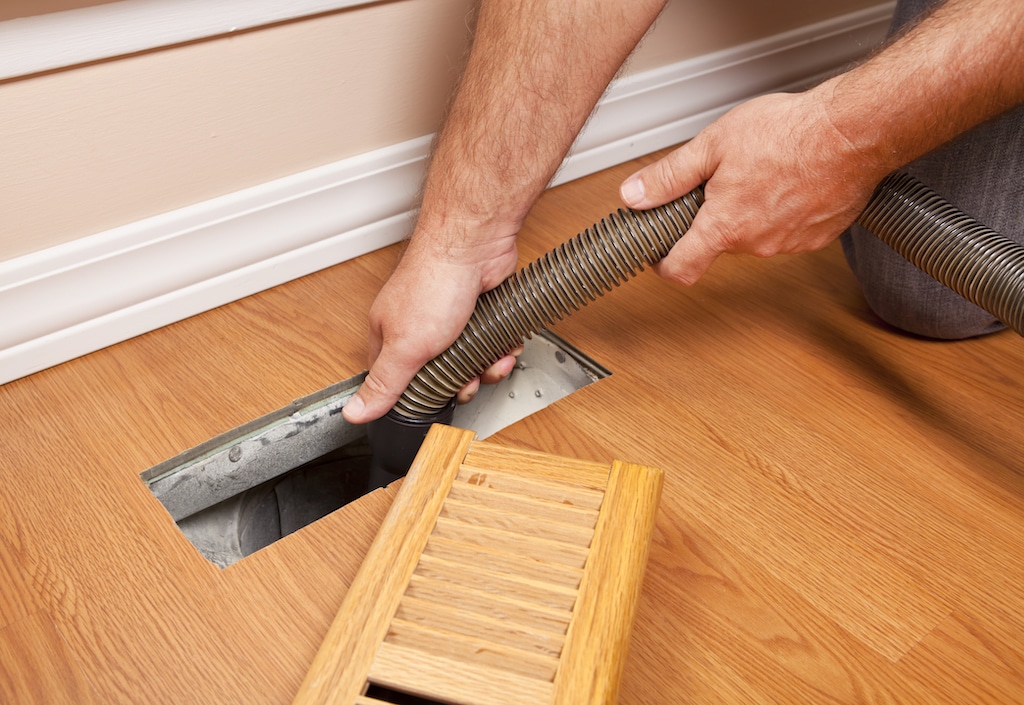
Best Practices for HVAC System Longevity
Ensure your HVAC system operates efficiently and lasts longer with these essential maintenance tips:
- Regular Maintenance: Schedule semi-annual check-ups in spring and fall.
- Air Filters: Change every 1-3 months to maintain air quality and system efficiency.
- Thermostat Management: Use programmable thermostats to optimize temperature settings.
- Ductwork Inspection: Annually check and seal ductwork to prevent air loss.
- Seasonal Preparations: Prepare your system for peak seasons to handle extreme temperatures.
- Listen for Noises: Address unusual sounds promptly to avoid major repairs.
By following these guidelines, you can improve your system’s performance and extend its lifespan.
Do you know how crucial your HVAC system is for your home’s comfort and energy efficiency?
Understanding your HVAC system is the first step to ensuring its longevity and optimal performance.
An HVAC system consists of several key components: the furnace, air conditioner, ducts, and thermostat. The furnace is responsible for heating the air, while the air conditioner cools it. The ductwork distributes the conditioned air throughout your home, and the thermostat controls the temperature settings.
By understanding these fundamentals, you can better recognize when your HVAC system needs attention and how to provide basic care. This knowledge not only helps in maintaining comfort but also in avoiding costly repairs and replacements.
Benefits of Routine HVAC Maintenance
Are you aware of the numerous benefits that come with regular HVAC maintenance? Routine upkeep is not just about preventing breakdowns; it also enhances efficiency, saves money, and improves air quality.
Improved Efficiency
Regular maintenance keeps your HVAC system running at peak efficiency. When components like filters and ducts are clean, your system doesn’t have to work as hard to heat or cool your home. This efficiency translates into lower energy bills and a smaller carbon footprint.
Extended Lifespan
Just like any other mechanical system, your HVAC system will last longer with regular care. Routine maintenance helps identify and fix minor issues before they become major problems. This proactive approach can add years to the life of your system, delaying the need for a costly replacement.
Better Air Quality
Maintaining your HVAC system ensures that the air circulating in your home is clean and healthy. Dirty filters and ducts can harbor allergens, dust, and bacteria, which can be harmful to your health. Regular filter changes and duct cleaning improve indoor air quality, making your home a safer place.
Cost Savings
Investing in routine HVAC maintenance can save you money in the long run. Preventative care reduces the likelihood of expensive repairs and emergency service calls. Additionally, a well-maintained system operates more efficiently, lowering your monthly utility bills.
Peace of Mind
Knowing that your HVAC system is in good condition provides peace of mind. You can rest easy knowing that your home will stay comfortable throughout the year, without unexpected breakdowns. Regular maintenance also ensures that your system complies with warranty requirements, protecting your investment.
By embracing routine maintenance, you’re taking a significant step towards ensuring your HVAC system remains reliable and efficient. This not only benefits your home but also your wallet and overall well-being.

Maintenance Schedule: When and What to Check
Keeping your HVAC system in top condition requires a well-planned maintenance schedule. Knowing when and what to check can make all the difference in maintaining efficiency and avoiding unexpected repairs.
Monthly Checks
Air Filters: Check your air filters monthly and replace them if they appear dirty. Clean filters ensure better air quality and efficient system operation.
Thermostat Settings: Ensure your thermostat settings are appropriate for the season. This helps maintain comfort and can save on energy costs.
Visual Inspection: Perform a quick visual inspection of your HVAC system. Look for any obvious signs of wear, damage, or debris around the outdoor unit.
Seasonal Checks
Spring: As you prepare for warmer weather, inspect the air conditioning unit. Clean the condenser coils and check the refrigerant levels. Ensure the outdoor unit is free of debris.
Fall: Before the cold sets in, focus on the heating system. Inspect the furnace, check the burner and heat exchanger, and clean or replace the filter. Make sure the flue system is secure and clear of obstructions.
Bi-Annual Professional Inspection
Spring and Fall: Schedule professional maintenance twice a year. HVAC technicians can perform detailed inspections, cleanings, and tune-ups that go beyond your basic checks. They will check the refrigerant, inspect ductwork, test the thermostat, and ensure the system is running efficiently.
Annual Checks
Ductwork Inspection: Check your ductwork annually for leaks, disconnections, and debris buildup. Sealing leaks can improve efficiency and air quality.
Outdoor Unit Cleaning: Clean the outdoor unit annually to ensure it operates efficiently. Remove any leaves, dirt, and debris that might obstruct airflow.
Special Considerations
After Severe Weather: Inspect your HVAC system after severe weather events. High winds, heavy rain, and snow can cause damage to outdoor units and ductwork.
Older Systems: If your HVAC system is older, it may require more frequent inspections and maintenance. Components wear out over time, so staying vigilant can prevent major issues.
By following this maintenance schedule, you can ensure your HVAC system runs smoothly year-round, avoiding costly repairs and maintaining a comfortable home environment.
Air Filter Replacement
Do you know how crucial air filters are to your HVAC system’s performance and your home’s air quality? Regular air filter replacement is a simple yet essential task that can significantly impact your system’s efficiency and longevity.
How Often to Replace Air Filters
Frequency: The frequency of air filter replacement depends on various factors, including the type of filter, your home’s air quality, and whether you have pets. A good rule of thumb is to check filters monthly and replace them every 1 to 3 months. Homes with pets or allergies might need more frequent changes.
Signs You Need a New Filter: If you notice increased dust in your home, higher energy bills, or your system struggling to maintain the set temperature, it might be time to replace the filter. A visual inspection can also reveal a dirty or clogged filter.
Choosing the Right Air Filter
Types of Filters: Air filters come in various types, including fiberglass, pleated, and high-efficiency particulate air (HEPA) filters. Fiberglass filters are inexpensive but need frequent replacement. Pleated filters last longer and offer better filtration. HEPA filters are the most efficient but might require a more powerful HVAC system.
MERV Rating: Filters are rated by the Minimum Efficiency Reporting Value (MERV). The higher the MERV rating, the better the filter is at trapping particles. For residential use, a MERV rating between 8 and 13 is typically recommended.
Consider Your Needs: Choose a filter that matches your household needs. If you have allergies, asthma, or pets, opt for filters with higher MERV ratings or HEPA filters to improve air quality.
Benefits of Regular Air Filter Replacement
Improved Air Quality: Clean filters trap dust, pollen, and other airborne particles, improving the air quality in your home. This is particularly important for those with allergies or respiratory conditions.
Enhanced Efficiency: A clean filter allows your HVAC system to run more efficiently, reducing energy consumption and lowering your utility bills. Clogged filters force the system to work harder, leading to increased wear and tear.
Prolonged System Lifespan: Regular filter replacement helps prevent dust and debris from accumulating in the system’s components, reducing the risk of breakdowns and extending the life of your HVAC system.
Replacing air filters regularly is a simple yet effective way to maintain your HVAC system and ensure a healthy living environment. By choosing the right filter and following a consistent replacement schedule, you can enjoy better air quality and system performance.
Cleaning the System
Do you want to maximize the efficiency and lifespan of your HVAC system?
Regular cleaning of your HVAC system is essential for maintaining optimal performance and ensuring good air quality in your home.
Steps to Clean Your HVAC System
Turn Off the Power: Before starting any cleaning, make sure to turn off the power to your HVAC system. This prevents accidents and ensures your safety.
Clean or Replace Air Filters: Start by cleaning or replacing the air filters. Dirty filters can restrict airflow and reduce efficiency.
Clean the Evaporator Coils: Over time, evaporator coils can become dirty and less effective at absorbing heat. Use a soft brush to gently clean the coils, or consult a professional for a thorough cleaning.
Clean the Condenser Coils: The condenser coils, located in the outdoor unit, can accumulate dirt and debris. Use a garden hose to gently wash away the buildup. Avoid using high-pressure water, as it can damage the coils.
Check the Drain Lines: The condensate drain lines can become clogged with mold or algae. Use a wet/dry vacuum or a pipe cleaner to clear any blockages.
Inspect and Clean the Blower: The blower assembly, located in the indoor unit, should be cleaned to ensure it functions properly. Dust and debris can accumulate on the blower blades, reducing efficiency.

Cleaning the Ductwork
Importance of Clean Ducts: Clean ductwork is crucial for maintaining good air quality and efficient HVAC operation. Dust, debris, and allergens can accumulate in the ducts, affecting your home’s air quality.
Inspect the Ducts: Regularly inspect your ducts for signs of dust buildup, mold, or leaks. These issues can compromise your HVAC system’s efficiency and air quality.
Professional Duct Cleaning: While you can clean accessible parts of your ductwork, a professional duct cleaning service can provide a more thorough cleaning. Professionals have specialized tools and expertise to clean the entire duct system effectively.
Seal Leaks: During the inspection, check for any leaks or gaps in the ductwork. Sealing these leaks with mastic sealant or metal tape can improve system efficiency and prevent conditioned air from escaping.
By following these steps to clean your HVAC system, you can ensure it operates efficiently, provides better air quality, and lasts longer. Regular cleaning is a simple yet effective way to maintain your HVAC system and keep your home comfortable.
Seasonal Inspections
Do you want to ensure your HVAC system is ready for each season? Seasonal inspections are crucial for maintaining efficiency and preventing unexpected breakdowns.
Preparing Your HVAC System for Summer
Check the Thermostat: As temperatures rise, make sure your thermostat is set to the appropriate cooling settings. Consider upgrading to a programmable thermostat for better control.
Inspect the Outdoor Unit: Clear any debris around the outdoor unit. Trim back plants and ensure there’s at least two feet of clearance. This allows for proper airflow.
Clean the Condenser Coils: Dirty coils reduce the system’s efficiency. Use a garden hose to gently wash away dirt and debris. Avoid using high-pressure water.
Check Refrigerant Levels: Low refrigerant levels can cause your system to work harder and reduce cooling efficiency. If you suspect a refrigerant leak, contact a professional.
Inspect the Ductwork: Ensure the ducts are sealed and free of leaks. Leaky ducts can cause cool air to escape, making your system work harder.
Test the System: Turn on your AC to ensure it’s cooling properly. Listen for unusual noises and check for any issues that need attention.
Winterizing Your HVAC System
Switch the Thermostat to Heat: As temperatures drop, switch your thermostat to heating mode. Check that the settings are appropriate for the season.
Inspect the Furnace: Clean the furnace burners and check for any signs of wear or damage. Ensure the pilot light or ignition system is functioning properly.
Clean or Replace the Filters: Clean filters are crucial for efficient operation. Replace them as needed to maintain good airflow and air quality.
Check the Heat Exchanger: Inspect the heat exchanger for cracks or corrosion. A damaged heat exchanger can pose a serious safety risk. Contact a professional for a thorough inspection.
Inspect the Flue System: Ensure the flue system is properly venting exhaust gases outside. Check for blockages or leaks that could affect performance.
Test the System: Turn on your heating system to ensure it’s working properly. Listen for unusual noises and monitor the system’s performance.
By performing these seasonal inspections, you can ensure your HVAC system is ready to handle the demands of each season. This proactive approach helps maintain efficiency, reduces energy costs, and extends the life of your system.
Thermostat Settings and Usage
Did you know that proper thermostat settings and usage can significantly impact your HVAC system’s efficiency and your energy bills? Understanding how to optimize your thermostat can lead to a more comfortable home and cost savings.
Optimal Thermostat Settings for Efficiency
Summer Settings: During the summer, set your thermostat to 78°F when you are home. When you are away, set it higher, around 85°F. This balance maintains comfort while saving energy.
Winter Settings: In the winter, set your thermostat to 68°F when you are home. Lower the setting to 60°F or lower when you are away or sleeping. This helps reduce heating costs without sacrificing comfort.
Away and Sleep Modes: Use the away and sleep modes on your thermostat to automatically adjust the temperature when you are not home or when you are sleeping. This reduces energy usage and lowers your bills.
How to Use Programmable Thermostats
Programming Basics: Programmable thermostats allow you to set different temperatures for different times of the day. You can create a schedule that matches your daily routine, ensuring comfort when you need it and savings when you don’t.
Setting Up Schedules: For weekdays, program the thermostat to start heating or cooling shortly before you wake up and return to an energy-saving mode after you leave for work. Set it to return to a comfortable temperature before you come home and enter energy-saving mode again when you go to bed.
Weekend Adjustments: Weekends might require a different schedule, especially if you spend more time at home. Adjust the thermostat settings to fit your weekend routine, maintaining comfort and efficiency.
Manual Override: Most programmable thermostats have a manual override option, allowing you to adjust the temperature without changing the programmed schedule. This is useful for unexpected changes in your routine.
Energy Efficiency Tips
Zone Control: If your HVAC system supports zoning, use it to control temperatures in different areas of your home. This allows you to heat or cool only the rooms you are using, saving energy.
Smart Thermostats: Consider upgrading to a smart thermostat. These devices learn your habits and adjust settings automatically to maximize comfort and efficiency. They can also be controlled remotely via smartphone apps.
Regular Maintenance: Keep your thermostat and HVAC system well-maintained. Dust and debris can affect the thermostat’s accuracy, and a well-maintained system operates more efficiently.
Insulation and Sealing: Ensure your home is properly insulated and sealed. Drafty windows and doors can cause temperature fluctuations, making your HVAC system work harder.
Ceiling Fans: Use ceiling fans to circulate air. In the summer, run the fan counterclockwise to create a cooling breeze. In the winter, run it clockwise to push warm air down from the ceiling.
Optimizing your thermostat settings and usage can lead to significant energy savings and improved comfort in your home. By understanding and implementing these strategies, you can make your HVAC system work more efficiently and effectively.

FAQ
- How Often Should I Service My HVAC System?
Your HVAC system should be serviced at least twice a year, ideally in the spring and fall. Regular maintenance ensures the system operates efficiently and helps identify potential issues before they become major problems.
- What Are the Signs of a Failing HVAC System?
Signs of a failing HVAC system include strange noises, frequent cycling, uneven heating or cooling, higher energy bills, and poor air quality. If you notice any of these issues, it’s time to call a professional for an inspection.
- How Can I Reduce My HVAC Energy Costs?
To reduce HVAC energy costs, maintain regular filter changes, schedule bi-annual professional inspections, use programmable thermostats, seal duct leaks, and ensure your home is well-insulated. Implementing these practices can significantly lower your energy bills.
- How Often Should I Replace My Air Filters?
Air filters should be checked monthly and replaced every 1 to 3 months. Homes with pets, allergies, or high dust levels might require more frequent replacements to maintain good air quality and system efficiency.
- What Are the Benefits of an Energy-Efficient HVAC System?
An energy-efficient HVAC system lowers energy costs, reduces your carbon footprint, improves comfort levels, and enhances indoor air quality. It also decreases the wear and tear on your system, extending its lifespan.


